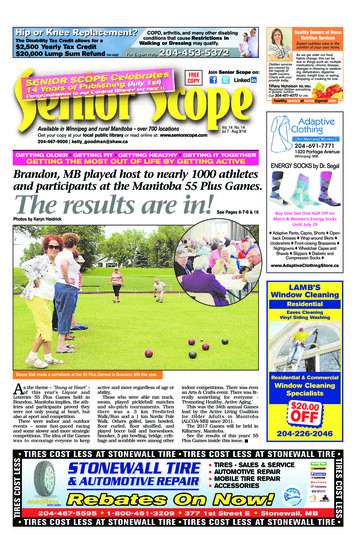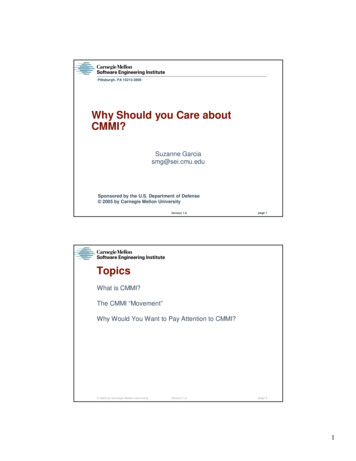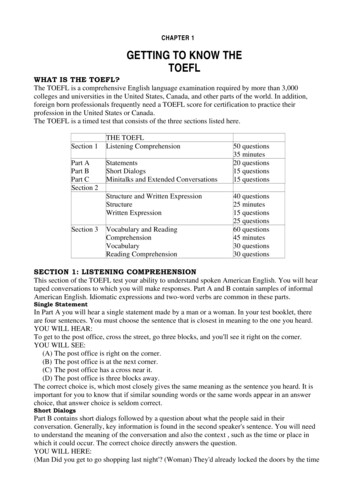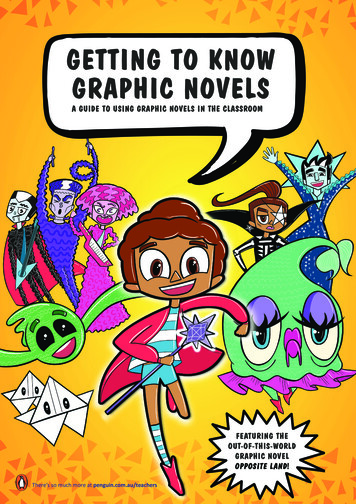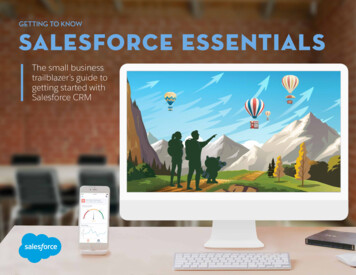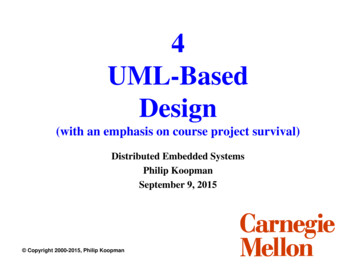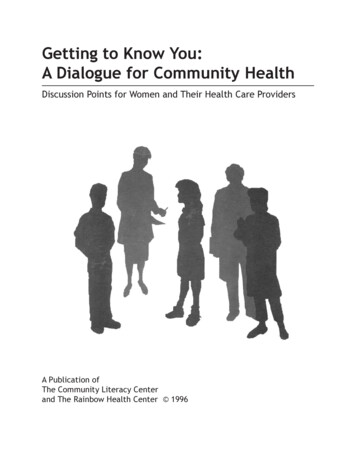
Transcription
Getting to Know You:A Dialogue for Community HealthDiscussion Points for Women and Their Health Care ProvidersA Publication ofThe Community Literacy Centerand The Rainbow Health Center 1996
The Community Literacy Center (CLC) is a community/university collaborativeof Pittsburgh’s 80-year-old Community House and the National Center for theStudy of Writing and Literacy at Carnegie Mellon. At the CLC, literacy meansnot just reading but writing. In the CLC ARGUE Project, community members,like these women and health care workers, build consensus, solve problems,and take action on pressing issues through group dialogue and writing.The Rainbow Health Center was founded in 1990 to provide primary healthcare services in the Mon Valley. By providing low-cost preventative, diagnostic, and treatment programs, the Center aims to improve the health of itssurrounding communities. Individual counseling and educational programsthat promote healthful lifestyle choices play an important role in the Center’soverall goals.Community Writers:Editors:Joann BrooksKathleen PayneBeth TullJoyce BarrowChau NghiemJane BirschbachPatricia GibsonLorraine HigginsCommunity Literacy Center801 Union AvenuePittsburgh, PA 15212(412) 321-5498Many Thanks to:Charlene GloverBrenda PayneRenee WilliamsHoung NghiemJanice FelknerPamela SelghTheresa ChalichRainbow Health Center142 East 8th AvenueHomestead, PA 15120(412) 464-1892Blue Cross of Western Pennsylvania, The R.K. Mellon Foundation, and the ThreeRivers Community Fund, who generously supported this project. Thanks to AnneMast, Kathy R. Meinzer, and Michael Schneider for their response and suggestionsfor the document.Getting to Know You: A Dialogue for Community Health 1996. Community Literacy Center/ Rainbow Health Center
Why We Wrote this Book1What D'Ya Know? (A Quiz).3Cancer and omIf.,., gedyMedicine.,,1)1)hysterectomy.RelationsMiss Ida and Achy Ann: Two Cases of .".,Will Mom GotoJail?WhatDoctorsIf. .?Dialogue.suspect., , , a mother , of neglect.,1113141515Let's Talk About S-E-XContraception,Pregnancy,FertileFergie:and SexuallyStereotypingAAnd woman I alwaysQuestions,Anyone?Pregnancy.Dialogue.wi1hout mscare. sicalmemories,",.,1223232424poem.2)2)Substance AbuseThe Big High or the Big Lie?A pregnantcrack addict must decideMyths about Addictions. ,Dialogue. 3)31Depression .EvenWildWhatIf.Women, , ? .,Questions,Anyone?Get, ,.,theBlues,31, .,, , , .31::QRights and Respansibilities33In Conclusion.::f
.Something is wrong. You haven't beenfeeling too well. Yet, the doctor seems tothink it's all in your head. But darn it! It IS your body, and i/you know anything,you know your body.The patient you are seeing seems so stubborn.prescription ?Why hasn't she been taking that.The doctor is explaining your test results. You can't understand those fancy medicalterms that just fly right by you. What's really wrong with you?.One minute this patient thanks you and nods her head when you explain thetreatment she' 11need, but later you find out from the nurse she is furious that youhaven't diagnosed her as she expected. What's going on with her?,Thein Health CareHealth care specialists are recognizing that effective treatment, regardless of goodgood technical equipment and medical knowledge, requires genuine cooperationand communication between doctors and patients:Physicians need rhetoric as much as knowledge. .Training in continuing care willbe of little value without doctors who know something of the life of the peoplewhom they serve. , .reading of course, must be accompanied by conversationsthat broaden the vistas available to us.lThe need is not for the distribution of services to passive recipients, but for activeinvolvement of local populations in ways which will change their knowledge,attitudes and motivation,2More than ever, community residents must work in genuine partnership with healthcare providers to create health in their own lives and in their communities. And yet ,residents who are served by urban clinics and the physicians and nurses who work inthem often have very different backgrounds. Cultural, educational, and economicdifferences between caregivers and patients can create barriers to communicationand interfere with effective treatment. Patients who misunderstand diagnoses or havepersonal or cultural reasons NOT to comply with treatment may waste preciousresources and may walk away feeling frustrated and misunderstood. Physicians may, inturn, label patients as uncooperative and be disappointed by the lack of results in theirprevention and treatment programs.This booklet addresses these barriers to communication and treatment by bringingtogether the expertise of caregivers at the Rainbow Health Center, female patients inthe Pittsburgh community , and staff from the Community Literacy Center (CLC) inPittsburgh. We invite you to use the book as a springboard to dialogue in yourcommunity or health care institution.ISpiro, Howard. (1992). What is empathy and can it be taught? Annals of Internal Medicine, I 16:843846.2Geiger, H. Jack. (1993). Community-oriented primary care: The legacy of Sidney Kark. Editorial inAmerican Journal of Publi2,l/eqJJh, 83 (7):946-947.1
Strategies forThis booklet grew out of a writing workshop based on strategies developed in theCommunity Literacy Center's ARGUE Project. Three strategies help diverse groups ofpeople, such as patients and health care workers, share their expertise and developinformed solutions to community problems:.DEVELOPING A PROBLEM CASEWriting a dialogue, scene, or story , we demonstratea conflict, its negative effects andthe conditions that contribute to it. Each section of this booklet introduces a differenthealth-relatedproblem through one or more powerful narratives. We invite you to usethese stories as discussion points in both physician training and patient educationprograms. The -symbolindicatesvarious points in the text .questionsyour groupmight use for discussion at.CREATING A SHAREDINTERPRETATIONWe recruit different stakeholders to the table, to share various kinds of expertise andanalyze the problem in greater depth. As the discussion progresses, we weave rivalperspectives into ourcwritten stories-uncoveringrival interpretations, assumptions,cultural knowledge, and communication strategies that different parties bring to thesituation. Throughout the booklet, the "Dialogue "and "Questions, Anyone" segmentshighlight technical and cultural knowledge important for addressing problems inwomen's health care.GENERATING OPTIONSFORACTIONBased on this collaborative discussion and writing, we devise new ideas, plans, andstrategies that will lead to change. Throughout this booklet, the "What If. ." segmentsprovoke new thinking about health care procedures, policy, and education. We hopethat you will sustain these ideas, improve upon them, and bring them into practice inyour community .TakingControl: A Note to FemalePatientsWomen often have a hard time talking and relating to doctors and vice-versa. Infact, some of us (admit it) get so frustrated that we avoid going to a clinic until it isabsolutely necessary , and by then it may be too late. Throughout this bookl t, we focuson obstacles to women's health-issues that have been neglected by the medicalfield and its research up until recently. We discuss not only common diseases andtreatments, but the way in which we communicate about our health with health careworkers.The women who have written this book for you are very much aware of thefactors that prevent us from getting good care. For example, we know that the colorof our skin or even sitting in an emergency room in less than our Sunday finery with ourvery active kids can sometimes not generate very much sympathy from ERnurses. Wehave been around long enough to know that being on medical assistance and feelinginsecure about ourselves because we have not gone beyond high school prevents usfrom speaking up and being assertive about what is wrong with us and what is best forour health.This booklet is about taking control of our health. We know that we sometimesneglect our own health care because we are busy caring for others. But if we aregoing to work outside the home and raise a family at the same time we definitely needto stay healthy. If we want to feel confident about ourselves when we go to the doctorand develop a relationship of equality , we need to inform ourselves about our bodiesand develop productive ways of talking to clinic and hospital staff so that we canmake good decisions about our bodies. We need to make sure physicians and nurseswho work in our communities understand our needs and concerns.2
Before reading this book, we suggest you sit down with your friends and co-workers to talkabout these issues. Later, you can compare your answers with the perspectives of doctors,nurses, and women in our community who contributed to this book.1. The stories you will read are about serious communication problems related towomen's health in the Mon Valley. Can you predict what key issues emerged in adiscussion with female patients?2. Why might some African-Americansbe reluctant to get tested for AIDS?3, What was the Tuskegee study and how might it affect the relationship between somedoctors and their patients?4. Anita's boyfriend, Tony, gave her the clap. He says he probably got itfrom a toilet seat at a bar he went to last month. You say:A. Poor Tony! He ought to sue them!B. Get a new boyfriend, girl. He's probably been sleeping with an infected woman.C. Anita, didn't your mother tell you to practice safe sex, even with your boyfriend? Ifyou had used a condom maybe this wouldn't have happened.D. Have you had unprotected sex with someone else yourself, Anita?5. Match the problem with the correct resource:1. I think I may have AIDS.2. New mom always has baby in stroller andDr. notices she never talks to baby.3. I am fearful my husband will hurt me again4. New mom cannot afford formula.6. Apapsmear will tell me if I have cancer7. Sexualabusersmolestotherpeoplea.b.c.d.Family ResourcesAllegheny Health DepartmentWoman's PraceWIC Programof the ovaries. TRUE or FALSE?becauseA. They are horny.B. The person being molested asked for itC. They have a sick need for power.8. I can get AIDS from drinking after someonewho has the virus. TRUE or FALSE?9. Who is more likely to be sexually abused; who is more likely to abuse?Young girl or boys? OR People with little/more education?ORA woman in her 205 or 405? OR Children from poor or wealthy families?10. Whoshouldhavean annualpapsmear?.3
What4.B,.,5B"","",C,andp;.;C-,' DD.The1Oyeen ondwomenchanCesofwhoD'YaKnow.g i gltft matotlet-have.Answersareextremelysex, or wom pover20!!egordJe fslim. ?tiyi!y
Ardillia was afraid of authority andespecially of Caucasians; there is ahistory of older black people, especiallyfrom the South, who are scared ofdoctors. For example, the Tuske geestudy is on everybody's mind. The U.S.Department of Health got black menfrom one little town who had syphilisand, instead of curing them like theypromised, they watched them to seethe effects of untreated syphilis. Theyeven used black doctors and nurses toconvince the men to participate. MissEvers, a black nurse in the study,promised free medical car . When shedrew their blood, they thought theywere getting treatment. The menwound up passing on the disease anddied.When Ardillia lived in the South, thehospitals were segregated. Manydoctors wouldn't even see blackpatients. She did not trust doctors.The doctors at St. Christopher's saidit was crucial at that point to get heroperated on. They were going to giveher a vaginal hysterectomy that woulddrop her organs down. They told thefamily, friends, and the home healthworker-a white nun-to go and talk toher. When I, her granddaughter,wentto convince her. she cussed me out. Iexplained they would put er to sleep.She said we were going along with thedoctors just to get her insurance.Charles, her grandson, could haveconvinced her, but he was chicken anddidn't want her to be mad at him. Hedidn't understand her women'sproblem either.Six months went by. Ardillia was sobad they put her on Dilaudid (a strongpain medicine). She was afraid to evenmove or show it because she thoughtsomeone would poison her withmedicine. She hid the medicine in herpillow case. She was in ridiculous painbecause she was scared to take themedicine and afraid because of herstereotypes and died a horrible deathwhen she didn't have to. Two weeksbefore she died, she finally asked forthe operation, but it was too late. No One WillExperiment on Me!by KathleenPayneArdillia Mitchellwas a tiny, thin ladywho had lost most of her hair. Shealways kept a clean vegetable tin canwith her to spit her snuff into. She wasfrom Mississippi originally but came upto Pittsburgh in her early twenties. Shewas now in her late sixties, and she hadcancer. This is her story.She was spraying for bugs in herhouse, and the floor was wet. Sheslipped and hit her back against thekitchen table. A couple days later, shestarted bleeding. She hadn't had aperiod in a long time, She figured it wascaused by the fall.She went to St. Christopher'sHospital. They told her she had cancerand explained they wanted to do acomplete hysterectomy on her. Theonly problem they said she would haveis that she might have to go to a nursinghome for a couple of months to heal,but she would recover, She sat there inthe chair and agreed with them,shaking her head saying, "Mmm Hmm,you're right." Then when the doctorwalked out of the room, BOY! Shewould tell her relatives how she reallyfelt. She swore they were lying to herand wanted to experiment on her. Shethought the doctors were trying to killher. The relatives told the doctor thatshe wouldn't give consent for theoperation.How would you interpret thissituation? What could be done?5
This story shows how a life of discrimination can cause aperson to stereotype doctors. After years and years, it is hard tochange your mind. In your heart even if you don't agree withthe doctors, you will say you do. The only healer she trustedwas a man they sent up every year from the South who wouldexorcise snakes from diseased bodies. It takes time for doctorsto explain things to a woman like Ardillia, but it is worth theA PATlfNTtime. Everybody is talking about the high cost of health care.SAYS.Medicineis great, but if you can't get it to the people, it ,doesn't work.The doctor might say, "Would you repeat back to mewhat I just said" to see if the patient really agrees and understands. The doctor mighthave noticed that Ardillia was shaking her head before he even could say it all-Iikethe little dogs in the back of the car. Maybe if I shake my head, she thinks, he will justget out of here.,-,".Sounds like she had advanced cervical cancer. That's sadbecause it could have helped if they caught this earlier with aPap smear. If someone had managed to break through hermistrust, even if she had not had surgery , the doctor could havehelped her in her pain and made her more comfortable.It sounds like she wouldn't have done well in a nursing home.,and that part of it might have scared her. If the doctor knew herA DOCTOR SAYS.betterhe might not. have suggested that., .How do YOu think a doctor could deal with It better?Granddaughter: Knowing some fears older African-American people have aboutexperiments on black people. Lots of black people today don't even like to get AIDStesting because they think you're giving it to them.01 r "I t;Doctor: But today? We have medical ethics and laws to prevent this kind of thing. Ican't believe people really fear this could happen.Granddaughter: It happened in this century-nottoo long ago-andstill is. On theradio this summer (1996) they said that Blacks and Latinos in L.A. were just given a new,experimental vaccine for measles, mumps, and rubella without their informed consent.The U.S.Center for Disease Control did this. That's too bad, because some people willnow refuse to come and get their kids shots, even though the kids need them. Youbetter believe this will spread through the black community like wildfire.Doctor: I really wasn't aware of how people still have so much fear around these issues,They cover this type of thing in medical school; very quickly, as a mistake of the past.And we don't spend a lot of time on cultural issues in medical training, especially backwhen I was in school.6
tIQuestion: Myouldn't let my mother get a hysterectomy-evenan-evenafter her healpoor and the doc told her not to get pregnant agaifearedshe would nobe a real woman! Many people in our community belhave ahysterectomye not a woman anymore. You can't get pleasure outA hysterectomy removes the uterus or womb where babies grow, so yo8;annot have childrenanymore. However, there is much more to being a woman than having babies. You can stillhave sex, and it should feel the same for you and the man. It doesn't affect the clitoris hich iswhat helps you have an orgasm.i!i!'-:IQuestion:Canyoubreo tfeedWi.rCancer cannot spread il-cancer?.ough the breast milk. it only spreadsthroughthe tissues in the women'sown body.Question:If you get bruised or punchedintlater, right?cancer therebreast, you could.1iNo. A punch or bruise won't cause cancer, but if discoloration orappear on yourbreasts for no reason or persist, show them to your doctor.Question: fpeople have told me if cancer hits air, it spread.obiopsies or J rationsQuestion:they don't want to getthat will open them up. They're better off keeping it sealed up. Is this true?Does it hurt to get a checkup?Make an appointment to have a gynecol.al.exam each year. They will do a pap test tocheck for cervical cancer; It is quick and doesn't hurt. They just insert a cotton swab (/ike a bigQ-tip) and smear it against your cervix to check for cancer cells. The doctor will also check yourbreasts for lumps. Ask the doctor to show you how to check your own breasts for lumps. Amammography (an X-ray of your breast) doesn't hurt except for a little pressure when they pressyour breast down on the shelf so they can take a picture of it. It feels like a squeeze and takes afew seconds.8
Question:What is cervicaland breast cancer,and what should I know aboutthem'Cancer is a group of diseasesthat are caused by the abnormal growth of cells. Thesecells multiply out of control and take over the normal cells. Tumorsform. Benign tumorsare not cancer and do not spread. Theycan be removed by surgery. Malignant tumorsare the bad ones-cancerous. Theydestroy tissueand spread throughout the body(metastasize).Because cancer can spread, it is important that the condition bediagnosed as soon as possible. Of all women, 33%will get some type of cancer duringtheir lives. Only prevention can reduce thisnumber.\SlN(You are at risk for breast cancerSymptoms:-Lump or thickening in breast-change in size or shape of breast-discharge from nipple-change in color or texture of skin-dimpling of breast tissueif yOL-are older than 40, and especiallyolder than 50-have relatives (mother, sister) with cancer-have never given birth-have a long menstrual history (start early)-have a high intake of dietary fats-have used birth control pills for a long time-smokeWomen with few or none of these symptoms arestill not "safe" from breast cancer. It is importantfor all women to learn and practice health habitsthat could lead to early detection.Preventive measures:-Personally examine your br
The Community Literacy Center (CLC) is a community/university collaborative of Pittsburgh’s 80-year-old Community House and the National Center for the Study of Writing and Literacy at Carnegie Mellon. At the CLC, literacy means not just reading but writi
